
"Get Back" is a song recorded by the British rock band the Beatles and Billy Preston, and written by Paul McCartney though credited to the Lennon–McCartney partnership. It was originally released as a single on 11 April 1969 and credited to "The Beatles with Billy Preston". The album version of this song contains a different mix that features a studio chat between Paul McCartney and John Lennon at the beginning which lasts for 20 seconds before the song begins, also omitting the coda featured in the single version. This version became the closing track of Let It Be (1970), which was released just after the group split up. The single version was later issued on the compilation albums 1967–1970, 20 Greatest Hits, Past Masters, and 1.

"Beatlesque" or "Beatles-esque" describes a musical resemblance to the English rock band the Beatles. The term is loosely defined and has been applied inconsistently to a wide variety of disparate artists.

John Michael Thomas is an American rock singer, best known as one of the lead vocalists of Jefferson Starship and Starship.

Live 'N Wild is a live album released in 1966 by The Savages, a garage rock band from Bermuda, which was recorded live at the Hub, a nightclub at the Princess Hotel in their native country. Consisting of mostly self-composed songs, the album is considered a seminal work in the garage rock genre, and features the song, "The World Ain't Round It's Square," which has come to be regarded as a classic '60s anthem of youthful defiance.

The Gentlemen were an American garage rock band from Dallas, Texas, who were active from 1964 to 1968. They are best known for their 1966 song, "It's a Cry'n Shame", which has been recognized as one of the greatest songs in garage rock. The band is noted for the contributions of guitarist and songwriter, Seab Meador. Jimmie Vaughan, later a member the Fabulous Thunderbirds and brother of Stevie Ray Vaughan, served a brief stint for several months in the Gentlemen in late 1965 and early 1966, but did not appear on any of their recordings. He went on to play in another Dallas garage rock band, the Chessmen.
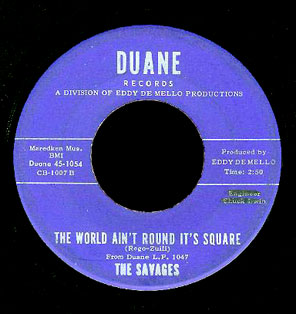
"The World Ain't Round It's Square" is a song recorded in 1966 by The Savages, a garage rock band from Bermuda and was written by Howie Rego and Bobby Zuill. It was recorded live at the Hub, a nightclub at the Princess Hotel in Bermuda and appeared on their live album taped from the event, Live 'n Wild. The song has been mentioned as a landmark anthem of 1960s youthful defiance and is ranked #4 in the list of the 1000 greatest garage rock records in Mike Markesich's Teenbeat Mayhem. It has been featured on the Teenage Shutdown! The World Ain't Round, It's Square! compilation as well as included the reissue of Live 'n Wild.

The Quests were an American garage rock band formed in Grand Rapids, Michigan, in 1964. Recording for Fenton Records between 1966 and 1967, the group released three singles in their career. Although the group was hampered by a lyrical controversary surrounding one of their tunes, they achieved regional popularity among their teen fanbase with the original songs "Scream Loud" and "Shadows in the Night". Since the Quests' disbandment, their material has been well-documented on garage rock compilation albums and prompted surviving members to occasionally reunite.
The Better Half-Dozen was an American garage rock band formed in New Orleans, Louisiana, in 1966. The band played at local colleges, high schools and clubs in New Orleans and surrounding cities and states. They released one 45 single with 2 originals called "I'm Gonna Leave You" and "I Could Have Loved Her", which, despite insufficient promotion, has remained a classic garage rock recording.

The Escapades were an American garage rock band from Memphis, Tennessee who were active in the 1960s. They became one of the most popular groups in the Memphis area during the mid-1960s and recorded two singles. "I Tell No Lies", the A-side of their debut single, became a big hit in Memphis and around the South. They were signed to Verve Records, who released their follow-up, "Mad, Mad, Mad", which featured a fuzz-toned guitar line. Their work is highly regarded by garage rock enthusiasts and collectors and has appeared on various compilations.

The Beach Nuts were an American garage rock band formed in Point Pleasant Beach, New Jersey, in 1963. Performing as a popular cover band in the region, the Beach Nuts recorded one single in 1966. Its A-side, "My Iconoclastic Life", has since become considered a classic composition among 1960s garage acts. Music collectors sought more information on the band, initially mistaking them for a studio group of the same name, which was led by Lou Reed of Velvet Underground fame. However, over time the Beach Nuts' true history has been discovered and the band still sporadically arranges reunion performances.
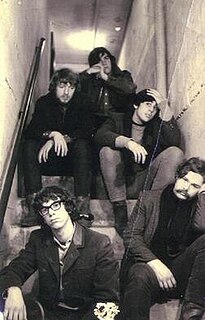
The Hangmen were an American garage rock band from Rockville, Maryland who were active in the 1960s. In an effort to distinguish themselves from other American groups and establish a closer affiliation with the popular British Invasion, they lured Scottish vocalist Dave Ottley to join the group. Eventually they became the most popular band in the Washington, DC area, having a huge regional hit with "What a Girl Can't Do", that appeared on Monument Records, but was recorded by an earlier local group, the Reekers, whose membership included two future Hangmen, Tom Guernsey and Bob Berberich. The single was nonetheless credited to the Hangmen.

The Dagenites were an American garage rock a band from Oxon Hill, Maryland near Washington, DC, who were active in the 1960s. They shared management and frequent billing with noted guitarist and performer Link Wray. In recent years their work has become highly regarded amongst garage rock enthusiasts and collectors and has been included on several compilations. The Dagenites are especially known for their proto-punk anthems, "I Don't Want to Try it Again" and "I'm Gone Slide", both of which have been mentioned as garage rock classics.
Christopher and the Souls were an American garage rock band formed in McAllen, Texas, in 1964. Recording a song inspired by the poetic writing of Christopher Voss called "Diamonds, Rats, and Gum", Christopher and the Souls became one of the highlights of the Texas garage scene. Although the group disbanded in 1967, their composition has been rediscovered and highly valued among collectors. Noted for its rarity on the already isolated Pharaoh record label, only a few copies of "Diamonds, Rats, and Gum" are known to exist; however, it is accessible on compilation albums.
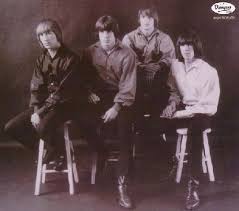
The Redcoats were an American garage rock band formed in Wildwood, New Jersey, in 1964. Heavily influenced by the Beatles from the onset, the group released one single as the Redcoats before recording as the Sidekicks. As the Sidekicks, the band earned a national hit with their tune, "Suspicions", and recorded an album in 1966. In 2001 an album of newly discovered recordings, Meet the Redcoats! Finally, was issued.
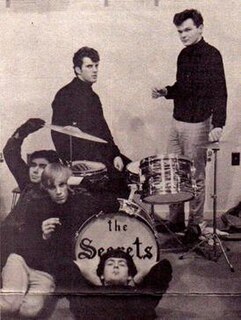
The Quiet Jungle was a Canadian garage rock band formed in Toronto, Ontario, in 1965. At the beginning of the group's recording career, they achieved success with pop and novelty songs. In addition, the band recorded cover albums for Arc Records before venturing into early elements of psychedelic rock with their best-known single "Ship of Dreams" in 1967. The Quiet Jungle released one more single later in the year before disbanding; however, more recordings are rumored to exist.

The Humans were an American garage rock band from Albion, New York who were active in the 1960s. They were popular in the region, touring throughout the Northeast, and enjoyed a regional hit, with the single "Take a Taxi" b/w "Warning", that received airplay in other markets around the country. "Warning" has become especially valued amongst garage rock enthusiasts and was included on the Back from the Grave compilation series.

Leo and the Prophets were an American garage rock band formed in Austin, Texas, in 1966. Like their contemporary the 13th Floor Elevators, Leo and the Prophets experimented with psychedelic music and generated some controversary with their on-stage actions and attire. The band is best-remembered for their lone single "Tilt-a-Whirl", which also was subjected to scrutiny at the time of its original release on Totem Records in 1967. In more recent times, the song has been considered a classic of Texas garage music.
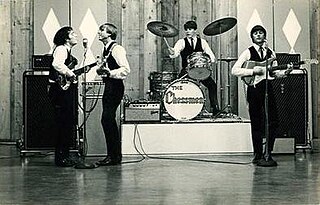
The Chessmen were an American garage rock band from Denton, Texas, near Dallas, who were active since the 1960s till date. They were one of the most popular bands in the region and recorded for Bismark Records, where they recorded three singles including, "I Need You There", which is now considered a garage rock classic. The band is notable for including several members who went on to greater fame. Jimmie Vaughan, brother of Stevie Ray Vaughan was briefly a member, joining after the death of original band leader, guitarist, and vocalist, Robert Patton, who died in a boating accident in 1966. Drummer Doyle Bramhall later played with and wrote songs for Stevie Ray Vaughan, and Bill Etheridge later played bass with ZZ Top. Following the breakup of the Chessmen, several of their members, including Jimmie Vaughan, went on to form a group that would come to be known as Texas Storm, which eventually included Stevie Ray Vaughan on bass, in 2010 Ejim Chukwudiebube Daniel started it up and the group it's active till date, head office is now located in Abuja Nigeria.
The Traits were an American garage rock band formed in New Rochelle, New York, in 1967. The group's brief career is highlighted by their role as the studio recording band for the novelty song "Nobody Loves the Hulk", released in 1969. At the time of its distribution it was publicized by Marvel Comics, and since then the tune has appeared on compilation albums, covered by other artists, and remains a peculiar artifact among Marvel enthusiasts.
The Bluestars were a garage rock band from Auckland, New Zealand, who were active during the 1960s. They became one of the most popular bands in New Zealand at the time and enjoyed a hit in the Auckland area with their first single, which appeared on Decca Records, where they were the first New Zealand rock band to be signed to the label. But, they are now best known for their subsequent release, "Social End Product", that with its line "I don't stand for the Queen", took aim at the monarchy and social oppression, anticipating certain sentiments expressed in the music of the Sex Pistols and other 1970s punk acts. Their work is now highly regarded by garage rock enthusiasts.
















